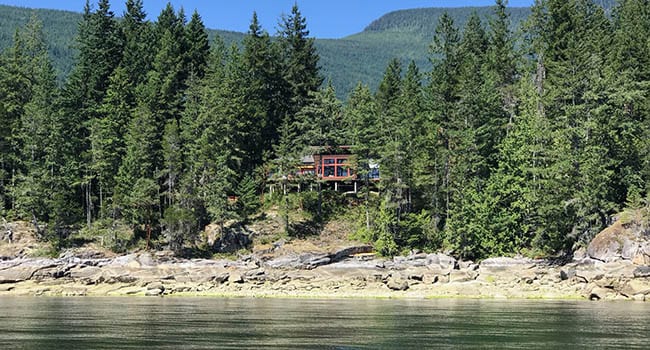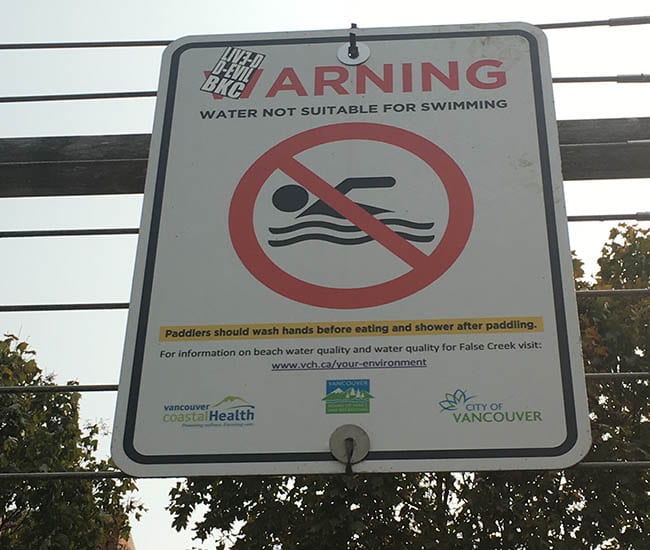
Skelhp House, on our 24 acres fronting on Jervis Inlet’s mouth. It’s a two-hour boat trip to Sarah Point at the entrance to Desolation Sound. Desolation Sound is an international cruising destination, famous for its warm swimming waters, coast mountain vistas, humpback whales and chinook salmon. Photo by Mike Robinson
 We began to embrace country life in 2004 when we bought recreational property at the north end of the Sunshine Coast, two ferry rides and about 100 km of driving up-coast from Vancouver. Still living in Calgary, we knew it was time to start planning for retirement and the post-work world.
We began to embrace country life in 2004 when we bought recreational property at the north end of the Sunshine Coast, two ferry rides and about 100 km of driving up-coast from Vancouver. Still living in Calgary, we knew it was time to start planning for retirement and the post-work world.
Our 24 acres fronts on Jervis Inlet’s mouth. It’s a two-hour boat trip to Sarah Point at the entrance to Desolation Sound, the delightful misnomer coined by Capt. George Vancouver in 1792, on a predictably sopping and foggy February’s day.
Today, Desolation Sound is an international cruising destination, famous for its warm swimming waters, coast mountain vistas, humpback whales and chinook salmon.
For the first four years we camped at varied locations on our land to find just the right spot for our house.
My wife produced a brilliant architectural design and we engaged a local Powell River building crew, led by the redoubtable Brian Henderson, to craft Skelhp House. Skelhp is the Shashishalhem (Sechelt language, Coast Salish) place name that means: “The place where the ancients dropped down from the heavens and taught us how to make paddles out of yew wood.”
We took possession in August 2008.
In January 2009, I ventured back to Vancouver, our home town, to lead the startup of the Bill Reid Gallery of Northwest Coast Art. My wife soon joined me after moving her architectural practice from Calgary. And so we began a city mouse/country mouse life in a 700-square-foot Olympic Village condo as we gradually wound down our careers.
It soon became apparent that growing up in the Vancouver of the 1950s, ’60s and ’70s was quite different from the town we returned to.
For example, the value of my parents’ house in the University Endowment Lands was equal to their combined incomes in the year of its purchase, 1968; in 2009, its value was equal to the equivalent of 16 years of income. And during this time nothing really changed in the neighbourhood. Vancouver house prices ballooned while frankly, the quality of civic amenities showed very marginal improvements.
I think the Vancouver of my youth had a much more radical visual and performing arts scene, and a much broader practise of cultural philanthropy. As well, regular folks could rent anywhere in the west side and young families existed in all neighbourhoods.
As kids we played ragtag street games in jeans and T-shirts. Not so now. Metro Vancouver has become a centre of privilege; of boys in Ferraris and girls in Gucci.
There are also signs in our Olympic Village neighbourhood that stress you should wash your hands before eating after paddling, and shower. “Water is not suitable for swimming” in False Creek, signs advise. So much for seaside living with all the amenities.
So after a decade of browsing about Vancouver while renting a tiny condo for $2,500 a month, we got a radical idea. We’ve decided to move to our country home and jettison the Olympic Village.
In many ways, we’re really repeating our Vancouver exodus of 1978, when fresh out of college we moved to Cowtown in Alberta to give ourselves some independence and a fresh start. Why not do the same thing now?
We’ve made new friends before, love outdoor pursuits like swimming, fishing, hiking and kayaking, and believe in volunteering and giving back. How about doing that on our own waterfront land, in the magical Skelhp House, while growing vegetables, cutting firewood, and co-existing with cougars, black bears, deer, otters, eagles, all sorts of sea ducks, sea lions and whales?
Perhaps best of all, 30 minutes up the road lies Powell River. Since its founding in 1910 by the Powell River Co. to produce newsprint, it has championed volunteerism, choral and symphonic music, the visual and theatrical arts, and dedicated outdoor living competencies.
Today, as the newsprint industry wanes, the region is home to a strong and dedicated small business sector and an environmentally astute triad of local governments: the Tla’amin Treaty First Nation, the qathet Regional District and the City of Powell River.
There’s also a well-established hospital, a comprehensive community recreation centre and the magical annual Pacific Region International Summer Music Association (PRISMA), whose board I chair.
Why not join us?

There are signs in our Olympic Village neighbourhood that stress you should wash your hands before eating after paddling, and shower. “Water is not suitable for swimming” in False Creek, signs advise. So much for seaside living with all the amenities. Photo by Mike Robinson
Mike Robinson has been CEO of three Canadian NGOs: the Arctic Institute of North America, the Glenbow Museum and the Bill Reid Gallery. Mike has chaired the national boards of Friends of the Earth, the David Suzuki Foundation, and the Canadian Parks and Wilderness Society. In 2004, he became a Member of the Order of Canada.
The views, opinions and positions expressed by columnists and contributors are the author’s alone. They do not inherently or expressly reflect the views, opinions and/or positions of our publication.

